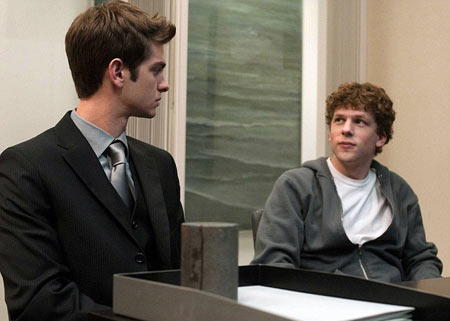|
 Andrew Garfield as Eduardo Saverin and Jesse Eisenberg as Mark Zuckerberg in the 2010 film The Social Network. |
|
Thinking of going into business with a friend? Your relationship could cost you, according to research. Researchers at Harvard University, in a study looking at friendship among venture capitalists, found that those who paired together based on how much they liked each other - as opposed to basing the decision on ability - were likely to see less success on their investments. 'The Cost of Friendship' report by three authors - whether they are friends or not is not known - studied more than 3,500 venture capitalists from 1975 to 2003. The study showed that if business partners of the same minority group worked together, their chances of a successful return dropped by 25 percent. By the same token, those partners who went to the same college saw their chance of success drop by 22 percent, and by 18 percent if they started a business together before. The report said: 'Collaborations based on characteristics unrelated to ability might suffer from a 'cost of friendship' and induce a negative relationship between affinity based similarities and performance.' If you want to see a real-world example, just look at Mark Zuckerberg and Eduardo Saverin. While the pair have both reaped millions - in Zuckerberg's case, many billions - the pair had an hugefalling-out in the early days of the social network, as was portrayed in the film The Social Network. The researchers said that the flip-side of working with friends included working with too many similarly-minded people, all sharing certain strengths and weaknesses, and potentially having poor decision-making as decisions would be made on a group basis. However, it is unlikely that this report will stop friends starting businesses together - it is one of the most popular ways to set up a business. But, as the authors, warn: 'To paraphrase Ralph Waldo Emerson, you cannot afford to be stupid with old friends when you are venture capitalists co-investing together.' (Read by Nelly Min. Nelly Min is a journalist at the China Daily Website.) (Agencies) |
在考虑和朋友合伙做生意吗?研究表明,你的友情会让你遭受损失。 哈佛大学的研究人员发现,那些选择交情好的人做合作伙伴的人,相比那些根据对方能力来选合作伙伴的人,在投资上更容易失败。这些研究人员对风险资本家之间的友情进行了研究。 这一研究报告名为《友情的代价》,由三个人共同撰写完成,至于他们是不是朋友就不得而知了。该研究在1975年到2003年间调查了3500名风险资本家。 研究显示,如果选择朋友作为自己的生意合伙人,他们的投资成功率将减少25%。 同样,那些上同一所大学的合伙人投资成功的几率会减少22%,如果过去曾合伙创业,那么成功几率将减少18%。 报告称:“根据与能力无关的性格来确立合作关系,将可能‘因友情而付出代价’,而且关系亲密的人相似点较多,这种相似性会对工作业绩产生消极影响。” 如果你想了解现实世界的例子,只需看看马克•扎克伯格和爱德华多•萨维林就知道。尽管这两人都获益数百万美金以上(扎克伯格是上百亿),但是正如电影《社交网络》中所描述的,他们却在社交网站创立初期大吵一架。 研究人员称,与朋友合伙的弊端在于,和太多想法相似的人一起工作,这些人拥有同样的长处和弱点,在集体做决定时,可能会做出糟糕的决定。 不过,这一报告也不大可能会阻止朋友们一起创业,毕竟这是最普遍的创业方式之一。 但是,正如作者们警告的那样:“改写一下爱默生的话:和老朋友一起做傻事没什么,但如果你是要和老朋友一起做风险投资,那你可输不起。” 相关阅读 (中国日报网英语点津 陈丹妮 编辑:Julie) |
|
Vocabulary: by the same token: 同样地,由于同样的原因 affinity: 密切关系 falling-out: 吵架 flip-side: 对立面 paraphrase: 改述,改写 |
